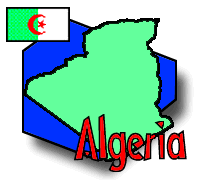 |
 |
 |
 |
 |
|
Itinerary/ Journal |
Discussions |
Resource Library |
eDscape Projects |
Scrapbook |
|
|
|
|
Copyright 1997-2002 BikeAbout. All rights reserved.

Contrary to popular belief, the white city of Algiers is a European city. During the day, it is a true souk; everyone is there -- men and women, young and old. One might even think that no one works (which might sometimes be the case). There are many young people strolling the avenues, following paths of a standard pattern that crisscross those of others. Some choose to return to stationary positions on stoops and in stairwells only just abandoned the night before. The guys, for better or for worse, try to pick up women, some more aggressively, others more affably. In turn, groups of young women happily lose their voices while revealing their charms as only women living in a conservative society can do. Sometimes they sport provocative clothing; other times they stick to the strict hidjah codes. It's fashion where the veil and the miniskirt go well together. Alluring stores freely compete, vying to see which can attract the most young people. Leather, hand-made goods, cosmetics. It's a consumer society. Everything is for sale.
Two 22-year-old students, Mahdi and Hocine, grew up in this environment. They happily agree to speak to me about their city.
We are seated in a café that is like a headquarters for rock and heavy metal bands, one of which Mahdi and Hocine belong to. This café is particularly accessible to young people. Unlike other tearooms, it doesn't require that anyone buy something to eat, nor does it force anyone to leave after an hour.
Mahdi and Hocine like their city and are proud of it. However, that doesn't stop either of them from dissecting it. Sometimes taking turns and sometimes together, they begin their analysis and a flood of words follows.
Algiers is a beautiful but polluted city. In the last few years, due to politics, decentralization and instability, more and more people are flocking to Algiers. Poverty is more and more evident. Children abandon school to take on their responsibilities as heads of families by selling recovered cigarettes or washing the windshields of cars caught in traffic jams. Crazy people wander the streets, and sometimes, when they are overheard, one wonders if they really are crazy. More and more young girls and boys have turned to prostitution just so that they can get by. Movie theaters are closed or little visited and most of the films shown there are pirated or on video.
At night, the city of Algiers is even more beautiful, but it belongs to a different world of people: racketeers, drug dealers, and smugglers. It is also the exclusive domain of men. They do with it what they can.
In the more popular parts of town, some young people have banded together to rent and make places in the outdoor alleys leading to apartment buildings for pool and ping-pong tables, and pinball machines. Those with the means go to nightclubs or organize parties.Mahdi and Hocine come to a conclusion: in the end, Algiers is not that different from other cities of the world. Only the problems are different.
 |
 |
 |
 |
 |
|
Itinerary/ Journal |
Discussions |
Resource Library |
eDscape Projects |
Scrapbook |
|
|
|
|
Copyright 1997-2002 BikeAbout. All rights reserved.